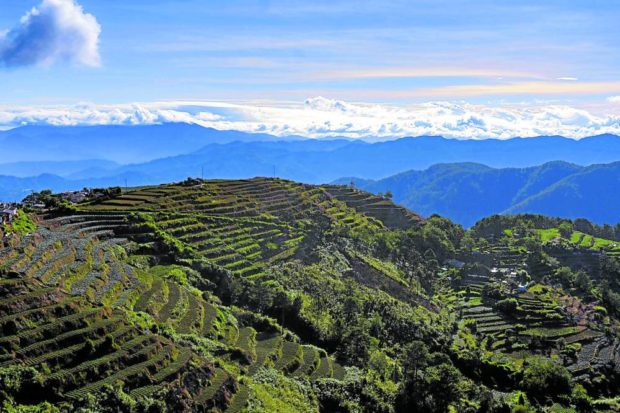Ex-solon can’t touch land on Baguio mountain – SC

MOUNTAIN VIEW Mt. Cabuyao, beside the more imposing Mt. Sto. Tomas straddling Baguio City and Tuba, Benguet, hosts vegetable and strawberry gardens carved out of the mountain side. The area spanning the Mt. Sto. Tomas Reserve was granted a permanent environmental protection order by the Court of Appeals to preserve its remaining forests. —NEIL CLARK ONGCHANGCO
BAGUIO CITY—The Supreme Court has ruled that a former Baguio lawmaker remained accountable for road excavations that damaged some of the city’s water sources and killed over 700 pine trees at the 3,114-hectare Mt. Sto. Tomas Forest Reserve in 2014.
Sitting en banc, the high court, in a decision in June last year that was received here only on Jan. 9, dismissed a legal challenge filed by former Rep. Nicasio Aliping Jr. against a permanent environmental protection order (Pepo) for Sto. Tomas that was issued on May 6, 2015, by the Court of Appeals (CA).
The Pepo, which restricts further human activities at the forest reserve, was awarded to the late Baguio Bishop Carlito Cenzon, Lingayen-Dagupan Archbishop Socrates Villegas and six other Baguio and Benguet residents, who filed and were granted a writ of kalikasan in 2014.
The writ petition was triggered by two excavations that were apparently intended for forest roads that were being constructed without permits. Mountain trekkers discovered the uprooted trees and dig sites branching off from Sitio Amliang to Sitio Pongayan (also known as Pungayan), and from Pongayan to Sitio Bekel, triggering an investigation that established the destruction of hundreds of trees there.
The Baguio Water District (BWD) also blamed debris from the excavations for polluting water sources that feed Baguio, Tuba and settlements along the Bued River in Pangasinan province.
Article continues after this advertisementAliping was charged for the excavations that led to his property on Sto. Tomas, which straddles Baguio and Tuba.
Article continues after this advertisementAcquitted
But he denied building new forest roads, and said he was developing an old logging road close to his property and vegetable garden.
Aliping declined when the Inquirer reached out to him on Monday for comment.
In 2021, he was acquitted of environmental offenses by a local court.
However, the Pepo already bars him from developing his Sto. Tomas property and orders him to rehabilitate the areas that were disturbed by the road projects.
According to the Pepo, Aliping must “permanently cease and desist from performing acts to develop or enhance the property he is claiming located at the Sto. Tomas Forest Reserve, which acts include bulldozing, leveling, or any earthmoving activity, improving the old building standing on the land, building any structure thereon.”
Aliping questioned the Pepo before the high court for violating his “right to equal protection of the law,” since other forest dwellers were not identified by the order and were not slapped with the same manner of restrictions by the appeals court.
But the Supreme Court decision, which was promulgated on June 21, 2022, and was received this week by writ petition lawyer Francisca Macli-ing Claver, said the Pepo also stopped the Tuba government from allowing further expansion of settlements and vegetable gardens at the forest reserve.
‘Ample evidence’
Aliping also protested the Pepo’s assumption that he was responsible for the destruction of trees and for polluting the BWD facilities when no evidence of his guilt had been presented to the courts.
The Supreme Court ruled that the CA had deliberated on “ample evidence … linking him (Aliping) to the tree cutting and earthmoving activities in the Sto. Tomas Forest Reserve—whether within or without his claim.”
“The confluence of the foregoing circumstances, to our mind, clearly indicates that the construction of the two offending roads was made at the behest of the petitioner (Aliping)—and no other,” said the ruling penned by Associate Justice Ricardo Rosario.
In 2017, the Supreme Court’s First Division rendered a similar judgment when Aliping questioned the charges filed against him by the Office of the Ombudsman in 2015 and 2016 for violating forest laws on Sto. Tomas.
“This latest (Supreme Court) decision gives Baguio hope for sustained water for the next 20 years,” said journalist Nonette Bennett, one of the petitioners, who also include Sheree Nolasco, Marie Balangue, Dr. Teresita de Venecia, Antonio Supremido Jr. and Pastor Gener Tandoc.
The Sto. Tomas Reserve is familiar to tourists because of the giant telecommunications radars at the peak of Mt. Cabuyao beside Mt. Sto. Tomas, which residents jokingly refer to as the city’s “air conditioners.”
In 2014 and 2015, Sitio Pongayan at Cabuyao became an instant tourist attraction when ABS-CBN shot the “teleserye” “Forevermore” at a fictitious village it put up there called “La Presa.” INQ